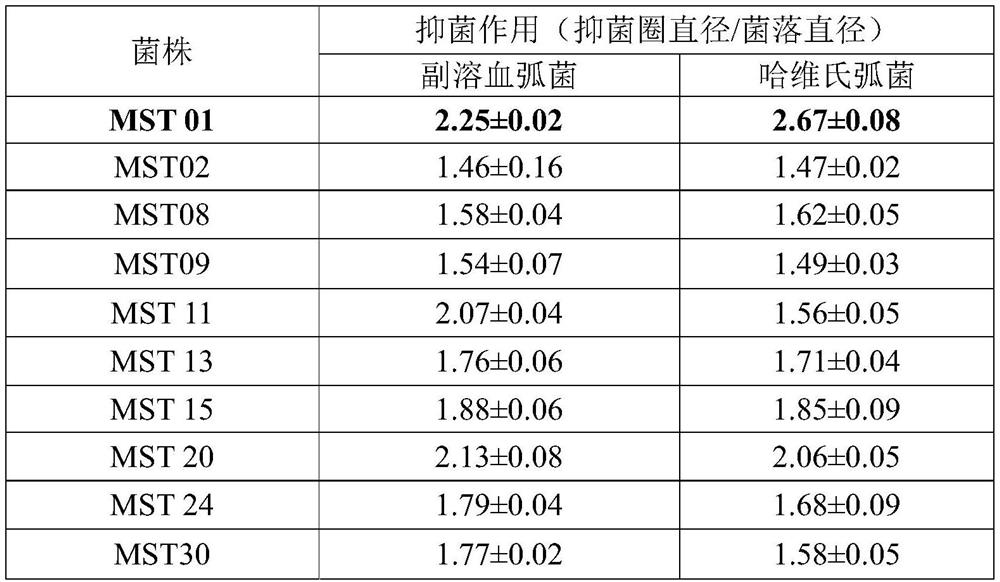A strain of Saccharomyces cerevisiae and its application in aquaculture
A technology for Saccharomyces cerevisiae and aquaculture, which is applied to Saccharomyces cerevisiae and its application in aquaculture, can solve problems such as harm to human health, drug resistance of pathogenic bacteria, destruction of normal flora structure, etc., so as to promote animal growth and improve utilization. The effect of reducing the probability of disease occurrence
- Summary
- Abstract
- Description
- Claims
- Application Information
AI Technical Summary
Problems solved by technology
Method used
Image
Examples
Embodiment 1
[0024] Embodiment 1: Isolation, screening and identification of strains
[0025] 1. Sample:
[0026] It was collected from a Litopenaeus vannamei farm in Rizhao City. Healthy and vigorous prawn intestines were picked by aseptic operation for subsequent separation.
[0027] 2. Screening method
[0028] Take the intestinal sample and put it into a grinder, put it into a normal saline, homogenize it, and centrifuge at a low speed, so that the bacteria in the sample are fully dispersed in the upper layer of normal saline, dilute it in a 10-fold gradient, and inoculate it on 2216E, TSB and MRS solid medium respectively. Cultivate at 28°C for 24h-48h. Select a uniform and clear single colony and streak to purify the bacteria. The single colonies were named MST01, MST02, MST03..., MST30 accordingly.
[0029] Using Vibrio parahaemolyticus and Vibrio harveyi as indicator bacteria, probiotics were screened by plate antagonism method. Spot the bacterial liquid to be screened on a pl...
Embodiment 2
[0037] Example 2 Effects of Saccharomyces cerevisiae MST01 on growth, immunity and stress resistance of Litopenaeus vannamei
[0038] In this experiment, a control group and a probiotic group were set up, and each group was set up in three parallels, with 200 Litopenaeus vannamei in each parallel. The high-temperature-cured commercial compound feed is used as the basic feed. Among them, the control group was fed with basal feed, and the probiotic group was fed with 10 7 CFU / g feed for S. cerevisiae MST01. The breeding experiment lasted for 56 days. The prawns were fed at 3-5% of their body weight every day, and the amount of bait was adjusted at any time according to the food intake. They were fed once a day in the morning and evening, and sucked and discharged once a day. During the experiment, the dissolved oxygen was ≥7mg / l, the temperature was 29±1°C, the salinity was 21-22‰, and the pH was 8.0±0.3. After the breeding experiment, the Litopenaeus vannamei were counted an...
Embodiment 3
[0047] Example 3 Effects of Saccharomyces cerevisiae MST01 on muscle quality and fatty acid composition of Litopenaeus vannamei
[0048] Saccharomyces cerevisiae MST01 was added to the diet of Litopenaeus vannamei, and the texture analyzer and gas chromatography were used to analyze the changes of muscle texture and fatty acid content of the shrimp after feeding, so as to study the effect of Saccharomyces cerevisiae MST01 on the muscle quality of Litopenaeus vannamei.
[0049] 1. Preparation of bacterial suspension
[0050] Saccharomyces cerevisiae MST01 was inoculated in the nutrient medium with an inoculum of 1%, cultured statically at 37°C for 20 hours, centrifuged at 4000r / min for 15 minutes after cultivation, washed 3 times with sterile normal saline, and resuspended in sterile normal saline , adjust the bacterial suspension concentration to 10 9 CFU / mL.
[0051] 2. Preparation of bacteria-containing feed
[0052] Add the treated bacterial suspension to the commercial ...
PUM
 Login to View More
Login to View More Abstract
Description
Claims
Application Information
 Login to View More
Login to View More - R&D
- Intellectual Property
- Life Sciences
- Materials
- Tech Scout
- Unparalleled Data Quality
- Higher Quality Content
- 60% Fewer Hallucinations
Browse by: Latest US Patents, China's latest patents, Technical Efficacy Thesaurus, Application Domain, Technology Topic, Popular Technical Reports.
© 2025 PatSnap. All rights reserved.Legal|Privacy policy|Modern Slavery Act Transparency Statement|Sitemap|About US| Contact US: help@patsnap.com



